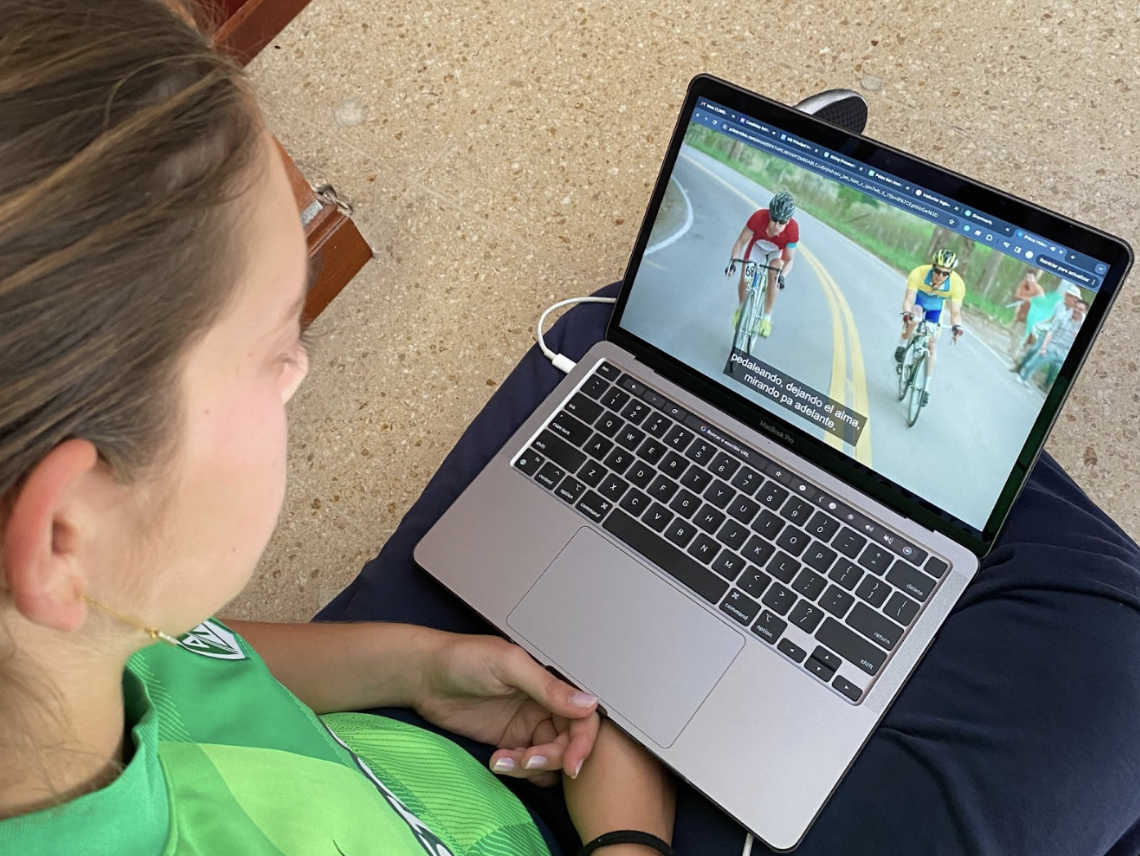The sun-drenched mountains of Antioquia roll across the screen, accompanied by the unmistakable rhythm of the Paisa dialect and a happy guitar. “Rigo” is a telenovela showcasing Colombian cycling champion Rigoberto Uran’s great loves: his father who was taken from him by a violent Colombia; Michelle, the woman he fell in love with when he was a child; and the bicycle that accompanied him to sell lottery tickets in his town Urrao and then to succeed in Europe. While dramatized for entertainment, it captures the essence of the Paisas showcasing its colorful traditions, humorous dialect, echoes of a violent past, and willpower.
From bustling Medellín to the rolling hills of Urrao, “Rigo” immerses viewers in the warmth and vibrancy of Paisa’s life. TCS senior Ambar Alvarez notes how the series “celebrates festivals, landscapes, customs, music, and especially the funny way we talk,” capturing the “distinctive rhythm of our accent mixed with our bulgar sayings” that makes their conversations hilarious. TCS senior Cristobal Jaramillo praises Juan Pablo Urrego’s character of Rigo, “a perfect replication of his humor and authenticity that made him famous.”
The telenovela provides a deeper look into professional cycling, competence, risks, but also the satisfaction of the sport. Cristina Franco, who has been cycling since 2013 and works in partnership with BMC Bikes and Go Rigo Go, Rigo’s clothing brand, shares,
“The series surprised me the most by the accurate representation of all of the sacrifice needed to become a professional cyclist, especially when you are living in extreme poverty and violence all around you. The willpower needed to overcome those difficulties is heartwarming.”
During the 80s and 90s, the state declared war against drug trafficking. The main urban actors were the Medellín and Cali cartels while rural areas were dominated by armed groups which characterized Colombia’s internal armed conflict from the 1990s to the 2000s. “Rigo” doesn’t shy away from showing the scars of violence below the skin of laughter and festivals. As Franco puts it, “Rigo reminds us of the fear we Colombians lived when urban areas were filled with cartels and rural areas with guerrillas and paramilitaries. When people disappeared and were found dead.”
This is where the telenovela format shines, while not without its occasional melodramatic moments, inherent to the genre, “Rigo” ultimately balances humor and lighthearted moments with genuine emotion such as the paramilitaries’ assassination of Rigo’s father. As Alvarez notes this is the hardest scene as it was both “suspenseful and sad, especially knowing the story behind Colombia and those abandoned to their luck in rural areas.”
“Rigo” also shines with fictional elements such as characters. Franco noted that Carmelo and Evaristo Rendon played by Emmanuel Restrepo and Julian Arango, are two greedy, cruel, and hilarious fictional characters who “seek pleasure in making Rigo’s life impossible making the whole story both interesting, suspenseful and extremely funny,” Other characters like mayor Tiberio Diaz, guerilla leader Uriel Vidal, Paola, Girlesa, Sofia Durango, etc, are “those characters with which we emotionally appeal as watchers,” Jaramillo said.
Rigo’s journey is at the heart of the series, a testament to the Paisa spirit of willpower, and belief in oneself. We see him navigate poverty, discrimination, and loss, always fueled by hoping to help his family and make them proud. “Rigo is a case of never giving up, staying true to yourself, dreaming high, and never letting anyone or anything define you,” Franco said. “He shows us that with passion and effort, anything is possible, no matter where you come from,” adds Jaramillo.
Beyond the warmth and vibrancy, “Rigo” also casts a critical eye on the ever-present shadow of political corruption in Colombia. The series subtly critiques systemic inequalities like skewed resource distribution, false peace agreements, money “lost” in projects, and false political speeches. However, some aspects of the story could have been explored in greater depth, offering a more nuanced portrayal of Antioquia’s history.
Despite its minor flaws, “Rigo” offers a captivating and heartwarming journey into the essence of Paisa culture. Its celebration of vibrant traditions, resilience in the face of adversity, and the pursuit of dreams resonate deeply with a country tired of blood and misery. Whether you’re a cycling enthusiast, curious about Colombian culture, or simply looking for a feel-good story, you can watch the telenovela live every day at 8:00 pm on Canal RCN or watch any of the current 48 episodes on Amazon Prime.



